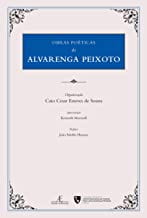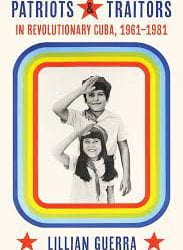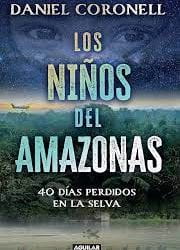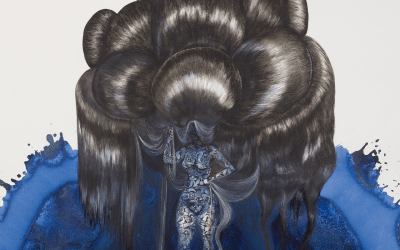Poetry and History in 18th-century Brazil

Obras poéticas de Alvarenga Peixoto, organização Caio Cesar Esteves de Souza, apesentação Kenneth Maxwell, prefácio João Adolfo Hansen (Cotia, São Paulo: Ateliê Editora/David Rockefeller Center for Latin American Studies, 2020, 236 pp.)
In his presentation of the beautifully published volume, Obras Completas de Alvarenga Peixoto, historian Kenneth Maxwell turns our attention to one of his specialties, the late 18th-century rebellion in Minas Gerais, known as Inconfidência Mineira or Conjuração Mineira.
The poetry collected in this edition, skillfully edited by Harvard Romance Languages and Literatures doctoral student Caio Cesar Esteves de Souza, becomes richer and historically relevant as Maxwell provides context and background on Ignácio de Alvarenga Peixoto (1744-1792). He describes a complex man with exaggerated expectations and frustrated ambitions, one who pursed unobtainable objectives. Born in Rio de Janeiro, Alvarenga Peixoto was educated in Porto and studied law at Coimbra, enjoying a successful career at that university and later for three years as desembargador in Sintra. In 1775, he was appointed judge in the Comarca do Rio das Mortes in Minas Gerais (Ouro Preto), where he became known for corruption and a high degree of promiscuity.
Much of his poetry seeks to curry favor with Portugal’s powerful prime minister, the Marquis of Pombal, and with Queen D. Maria I. After the Conjuration in which he participated was denounced and Alvarenga Peixoto imprisoned at Ilha das Cobras, he wrote expressive poems to his wife, the poet Bárbara Heliodora Guilhermina da Silveira (1759-1819), and others to D. Maria I begging for mercy. Exiled to Angola, he died of tropical fevers after some six months, at age 48. If it were not for his participation in the proto-independence group inspired by documents from North America, it is unlikely that his poetry would be the object of dedicated research and study. Caio Souza identifies the poetry as “conventional for the 18th century, uniform in style […] simple images, amorous themes, verses easily understood with some musicality.” The manuscripts he located contain variants suitable for oral performances, which, according to Maxwell, were common in Portuguese and Brazilian lettered traditions.
Of the three previous editions dedicated to the poetry of Alvarenga Peixoto, Caio Souza relies primarily on the Portuguese philologist Manuel Rodrigues Lapa’s Vida e Obra de Alvarenga Peixoto (Rio de Janeiro, Instituto Nacional do livro, 1960) for its biographical sketch and for its basic corpus of 33 poems. Two earlier editions of Alvarenga Peixoto are Domingos Carvalho da Silva’s Obras Poeticas de Ignacio José de Alvarenga Peixoto (São Paulo, Clube de Poesia, 1956) and the first dedicated exclusively to the poet, Joaquim Noberto de Souza e Silva’s Obras Poeticas de Ignacio José de Alvarenga Peixoto Colligidas, Annotadas, Precedidas do Juízo Critico dos Escriptores Nacionaes e Estrangeiros e de uma Noticia Sobre o Autor e Suas Obras com Documentos Historicos (Rio de Janeiro, Garnier, 1865). Many of the poems in these three editions came from two prior printed collections, Januário da Cunha Barbosa’s Parnaso Brasileiro ou Collecção das Melhores Poezias dos Poetas do Brazil, Tanto Ineditas, como Ja Impressas (Rio de Janeiro, Typografia Imperial e Nacional, 1829-1832) and Elias Matos’ Miscelânea Poética ou Coleção de Poesias Diversas de Autores Escolhidos (Rio de Janeiro, 1853).
Noberto’s edition contains only 27 poems, to which is added “Conselhos a Meus Filhos,” attributed to Bárbara Heliodora and absent from Lapa. Domingos Carvalho da Silva’s edition repeats Noberto’s (minus the “Conselhos”), while excluding two other poems considered of doubtful attribution and altering the order of presentation to what Silva estimated to be the most probable chronological order of appearance. While Noberto separated the poems by genre (sonnets, lyric, odes, cantata, birth encomiums, sestinas), Lapa, like Silva before him, attempted to order them by biographical chronology, unsuccessfully in Souza’s opinion, although with a different result. In his introduction to the current edition, Souza includes a chart to track the position of the poems in the three previous editions, which total 27 (Noberto), 25 (Silva) and 33 (Lapa).
Preparation for this edition of Alvarenga Peixoto’s poetic works sent researcher Caio Souza to eleven libraries and archives in Brazil (São Paulo, Rio de Janeiro) and Portugal (Lisboa, Coimbra, Porto, Évora) for two years in a search for primary sources and, if possible, original texts (detailed on pp. 55-56), thanks to a fellowship from the Fundação de Amparo à Pesquisa do Estado de São Paulo (Fapesp). He was well prepared for this task by his M.A. thesis at the University of São Paulo, “Alvarenga Peixoto e(m) seu tempo” (2017), directed by João A. Hansen, who contributed a preface to this publication. Souza’s thesis made him aware of deficiencies and problems in the three editions of the poetry, which motivated him to search for their primary sources. As a method, Souza compared manuscripts located in Brazilian and Portuguese libraries and archives with printed versions, noting variants and discussing the previous editors’ justifications for their decisions.
One of the major contributions of this edition, praised by Maxwell, is the addition of six poems to the corpus that Souza discovered in the Biblioteca Brasiliana Guita e José Mindlin at the Universidade de São Paulo in a manuscript once belonging to the collector Rubens Borba de Moraes, a poetic collection titled As Flores do Parnaso ou Coleção de Obras Poéticas de Diferentes Autores Juntas pelo Cuidado de I…N…T…M…,” being five volumes of manuscripts of diverse authors and styles. The six poems attributed to Alvarenga Peixoto are portraits of different feminine personae (Armânia, Anarda, Josina, Filis, Nise and Filena).
In the current volume, the fourth edition of the poetry of Alvarenga Peixoto, Souza has chosen to group the 41 poems (33 from Lapa, the six he discovered, a sonnet found by Francisco Topa in Évora, and the poem by Barbara Heliodora) according to their primary sources, either manuscript or printed, and to present them as located in the order of his research travels. Thus the findings mirror his individual research experience. The printed sources are ordered by the chronology of the editions, starting with a poem included in the first edition of the epic poem O Uraguai, by Basílio da Gama (1769).
To exemplify the comparison of variants, Souza presents in his introductory essay three versions of the sonnet “Eu vi a linda Jônia e, namorado” (per Lapa), finding variants in a single sheet at the Biblioteca da Ajuda in Lisbon (“Eu vi a linda Estela e namorado”) and in a manuscript codex in the Biblioteca Geral da Universidade de Coimbra (“Eu vi a linda Jonia enamorado”). He concluded that this sonnet, as were other poems, had been adapted for oral performances that allowed for improvisation, however without altering the poem’s rhythmic or sonorous qualities. Departing from these studies, and from the point of view of performance, Souza arrived at one of his most original critical ideas, which is that previous editors, in attempting to define an 18th-century style through philological methods, were effectively searching for an “authentic” or “genuine” text that effectively never existed, or almost certainly no longer existed. Brazil’s original colonial literature, particularly, exists today only in scattered copies that happen to have survived; all the more reason for Souza to begin his quest to locate primary texts for the 40 poems, with their variant readings, to present to the reader, so as to complete what can be known about Alvarenga Peixoto’s poetry. For 29 poems Souza found no significant difference in the copies he located, however others produced multiple copies with variants. As had Noberto, Souza also decided to include the poem “Conselhos a Meus Filhos,” probably by Bárbara Heliodora, since its attribution is uncertain, and if it were by Bárbara Heliodora its presence would authenticate feminine authorship in the colonial period in one of the few known texts.
Not every search yielded the desired results, in days of Covid-19, leaving intriguing details for future research. A sonnet published by Noberto, for example, which could be found, according to Lapa, in a manuscript belonging to the Casa Lavradio, dated August 1799, could not be obtained; and another in Noberto, dedicated to the Viceroy of Brazil, D. Luís de Vasconcelos e Souza, had no previous known manuscript. Two poems published by Elias Matos also turned up no earlier manuscript copies, and there is the question of lost works, a drama, Enéias no Lácio, a tragedy, Merope (translated by Scipione Maffei), and a sonnet on the heroes of North American independence suppressed by Noberto for its reputedly offensive and undignified content.
Maxwell is justified in praising Souza’s diligent and even obstinate archival research, which has allowed the reader of 18th-century poetry to enter the creative world of Alvarenga Peixoto in which his compositions were performed and read. Such a reader may find even in its stylistic and thematic conventions the expressive qualities of a poem written to Bárbara Heliodora from prison, “Barbara bela / Do norte estrela / Que o meu destino / Sabes guiar / De ti ausente / Triste somente / As horas passo / A suspirar”, or these verses from the sestet of a sonnet on the theme of desengano “Ah! Quão depressa então acabar vira / Este enredo, este sonho, esta quimera, / Que passa por verdade, e é mentira!” With the aid of Souza’s new edition, readers may imagine the performance of Alvarenga Peixoto’s verses, perhaps in a Brazilian modinha for voice and guitar.
Winter 2020, Volume XX, Number 1
Kenneth David Jackson is professor of Luso-Brazilian literatures and cultures at Yale University, whose interests include music, ethnography, and the Portuguese in Asia. His most recent book is Cannibal Angels: Transatlantic Modernism and the Brazilian Avant-Garde (2021).
Related Articles
A Review of Patriots and Traitors in Revolutionary Cuba, 1961-1981
I remember when I first heard Lillian Guerra speak: over fifteen years ago, at Brown University, about her third book, Visions of Power in Cuba: Revolution, Redemption and Resistance (1959-1971).
A Review of Los Niños del Amazonas: 40 Días Perdidos en la Selva
Los niños del Amazonas. 40 días perdidos en la selva is the first true book by Colombian journalist Daniel Coronell, whose long and impressive career speaks for itself: news director of manifold networks; recipient of prestigious recognitions such as Emmys, Peabodys and Simón Bolívar prizes; and arguably the most widely read columnist in Colombia, where he is as much admired as he is feared.
A Review of Channeling Knowledges: Water and Afro-Diasporic Spirits in Latinx and Caribbean Worlds
Water is a powerful tenet of Afro-diasporic religions that troubles academic disciplines and racial categories that define state, military and geographic borders.




